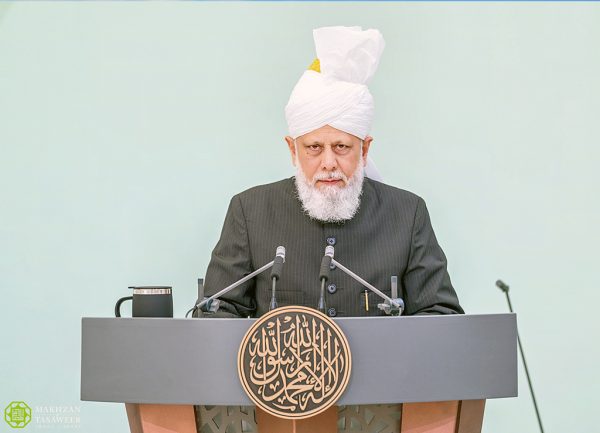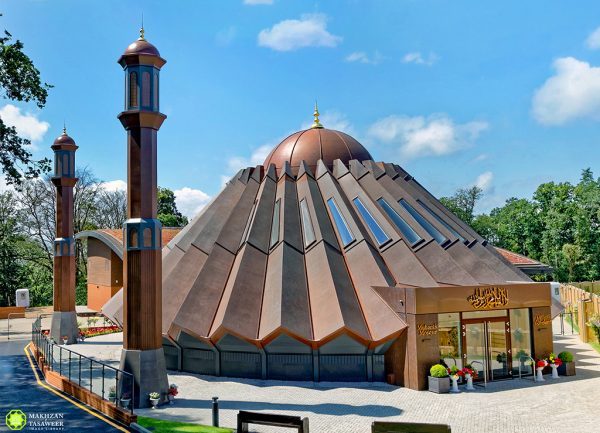
Friday Sermon Summary 22nd September 2023: ‘Life of the Holy Prophet (sa) – Prophecy of the Byzantine Victory Over the Persians’
After reciting Tashahhud, Ta‘awwuz and Surah al-Fatihah, His Holiness, Hazrat Mirza Masroor Ahmad (aba) said, that some time ago, incidents pertaining to Holy Prophet (sa) and the Battle of Badr were being mentioned. Today as well, some incidents relating to the Battle of Badr will be mentioned.

His Holiness (aba) said that the Holy Prophet (sa) remained at Badr for three days. From Badr, the Holy Prophet (sa) sent Hazrat Abdullah bin Rawaha (ra) and Hazrat Zaid bin Harithah (ra) to Madinah in order to relay the good news of victory. Thereafter, the Holy Prophet (sa) began his journey back home to Madinah. There were 70 prisoners along with this victorious caravan. Some historians record that on the journey back, two prisoners were killed according to the Arab customs at the time, due to their crimes in war. However, not all historians are in agreement about the authenticity of whether this truly did take place or not. There are also incidents about the sister or daughter of one of those killed reciting some poetry, and upon hearing it the Holy Prophet (sa) was moved to tears. However, this incident is also refuted by some historians. His Holiness (aba) said that Allah knows best in this regard.
Treatment of Prisoners of War
His Holiness (aba) said that Hazrat Mirza Bashir Ahmad (ra) has mentioned the above matter as follows:
‘Among the chieftains of the Quraish who are recorded to have been taken captive, some historians have mentioned the name of ‘Uqbah bin Abi Mu‘it, and it is written that by the order of the Holy Prophet (sa), he was later killed in captivity. However, this is not correct. Narrations of Ahadith and history very clearly mention that ‘Uqbah bin Abi Mu‘it was killed in the field of battle, and was among those chieftains of Makkah whose corpses were buried in a pit. Albeit, the execution of Nadr bin Harith is evident from many narrations. The reason for his execution was that he was among those people who were directly responsible for the death of those innocent Muslims who had been martyred at the hands of the Quraish in Makkah.
Furthermore, it is most probable that Nadr bin Harith was among those who had brutally martyred Harith bin Abi Halah, the step-son of the Holy Prophet (sa), in the early period of Islam. However, it is definite that except for Nadr, no other prisoner was executed, nor was it a practice to execute prisoners merely due to their being an enemy or fighting on behalf of the opposing side. Therefore, later on, a specific injunction was revealed in the Holy Qur’an with regards to this as well. Moreover, it should also be remembered that although many narrations have recorded the execution of Nadr bin Harith, there are also certain narrations which prove that he was not executed; rather, he remained alive after Badr for a period in time and finally became a Muslim, and joined the servants of the Holy Prophet (sa) at the occasion of the Ghazwah of Hunain. However, these latter narrations have generally been deemed weak in comparison to the ones mentioned first. وَاللّٰہُ اَعْلَمُ [Allah knows best].
In any case, if there was any individual who was executed from among the prisoners, it was Nadr bin Harith, who was executed as an act of retribution. In this respect, it is also narrated that after his execution, when the Holy Prophet (sa) heard the painful couplets of his sister, he said, “Had these couplets reached me earlier, I would have forgiven Nadr.” In any case, except for Nadr, no other prisoner was executed; rather, as mentioned above, the Holy Prophet (sa) emphatically commanded that the prisoners should be treated with kindness.’ (The Life & Character of the Seal of Prophets (sa), Vol. 2, pp. 159-160)
His Holiness (aba) said that it is recorded that during the Battle of Badr, 70 disbelieving Makkans were killed at the hands of the Muslims, while 70 others became captives. In accordance with the commandments of the Holy Prophet (sa), the Companions treated these prisoners with great kindness. It was in light of this kindness, along with the great teachings of Islam that led many of the captives from Badr to ultimately accept Islam.
Prophecy of the Victory of the Byzantines
His Holiness (aba) said that another incident related to the Battle of Badr was the victory of the Roman Empire, which had been foretold by the Holy Prophet (sa). In 5 AH, Surah al-Rum was revealed, in which the victory of Rome was mentioned. It is recorded that upon the revelation of these verses to the Holy Prophet (sa), Hazrat Abu Bakr (ra) announced the following verses in the environs of Makkah:
‘Alif Lam Mim.The Romans have been defeated. In the land nearby, and they, after their defeat, will be victorious. In a few years (three to nine years)’ (The Holy Qur’an, 30:2-5)
His Holiness (aba) said that since the Makkans and Persians were both idolaters, the Makkans wished for the Persians to win. However since the Muslims and Romans were both people of the book, the Muslims wished for the Romans to be victorious. Hence, the Makkans set conditions with each other of what each would receive if their desired side was victorious, and they set the period of five years for this to happen. Ultimately, the Romans were victorious and it was on the day of the Battle of Badr that the Muslims learned of the Roman’s victory.
Testimony of Non-Muslims Regarding the Prophecy
His Holiness (aba) quoted various historical references detailing the victory of the Romans, and how, despite seemingly being the weaker side, the Romans were victorious in light of the Qur’anic prophecy. His Holiness (aba) also quoted Edward Gibbon, a Roman historian who, upon detailing the Roman victory, expressed his astonishment and amazement at the amazing accuracy of the prophecy made in this regard by the Holy Qur’an.
His Holiness (aba) said that many youth write to him asking how they can know that Islam is the truth and the true religion as compared to others. The society around them has caused doubts to arise in their minds. However, they simply need to look back to history and such expressions of non-Muslims regarding these prophecies. Similarly, they need only to ponder over the prophecies which were made regarding our current times. Parents should also understand these prophecies so that they may be able to teach their children. These prophecies are proof for the truthfulness of Islam. Indeed there are thousands of proofs for the truthfulness of Islam. One need only increase their knowledge.
His Holiness (aba) said that Hazrat Mirza Bashir Ahmad (ra) reconciles certain historical discrepancies about whether the Roman victory took place at the time of the Battle of Battle of Badr or during the time of the Treaty of Hudaibiyah as follows:
‘In various narrations it has been related that the Byzantines acquired this victory in the era of the Treaty of Hudaibiyah. However, these narrations are not contradictory, because in actuality, the era of the Byzantine victory covered a period spanning from the battle of Badr to the Treaty of Hudaibiyah.’ (The Life & Character of the Seal of Prophets (sa), Vol 2, p. 174)
Truthfulness of the Prophecy Regarding the Byzantine Victory
His Holiness (aba) also quoted the Promised Messiah (as) and the Second Caliph (ra) regarding the truthfulness and veracity of the Qur’anic prophecy regarding the Roman victory. For example, the Promised Messiah (as) said that this prophecy was made at a time when the Muslims were in a state of weakness. Not only was this prophecy made, but a restriction of time was also placed. Further to this, it was also stipulated that not only would the Romans be victorious, but at the same time the believers would also become victorious. Ultimately, this prophecy was fulfilled exactly as it was foretold with all of its conditions.
His Holiness (aba) said that he would continue narrating these incidents in the future.

Funeral Prayer
His Holiness (aba) said that he would lead the funeral prayer in absentia of the following deceased member:
Firas Ali Abdul Wahid
Firas Ali Abdul Wahid of the UK who recently passed away. He was originally from Iraq. He accepted Islam Ahamdiyyat in 2012. He is survived by his wife and a daughter. He had memorised the Holy Qur’an when he was young. He became an extremist Muslim, selling the home’s TV and ripped up all the pictures in the home, saying that these things were haram. Despite being a good artist himself, he had become indoctrinated by other fanatic Muslims and thought that such things were forbidden. However, after a while, he started questioning his beliefs, and after discussions with a Christian friend, he became a Christian. Later, he reverted to Islam. He was very knowledgeable and had an aptitude for learning languages. He moved to the UK in 2009. It was here that he came across MTA and started receiving the answers to his questions. He saw the Fourth Caliph (rh) in a dream, and then he eventually accepted Islam Ahmadiyyat in 2012. He went on to become staunch in his faith and would proudly propagate and defend Ahmadiyyat. His Holiness (aba) prayed that may Allah grant him forgiveness and mercy, elevate his station, protect his family and grant them patience, and accept his prayers for his family. His Holiness (aba) prayed that may Allah grant the Community such people in the future.
Summary prepared by The Review of Religions



